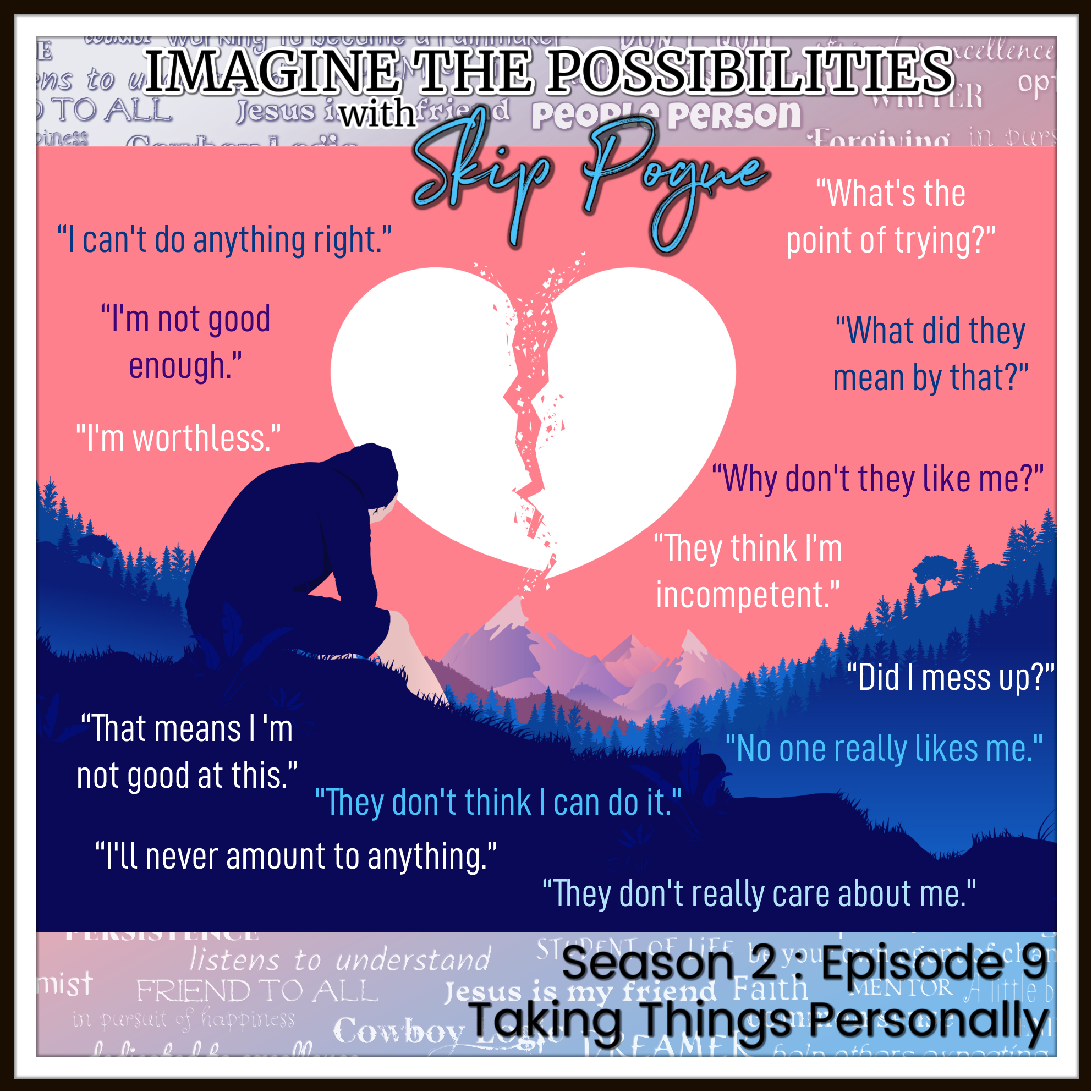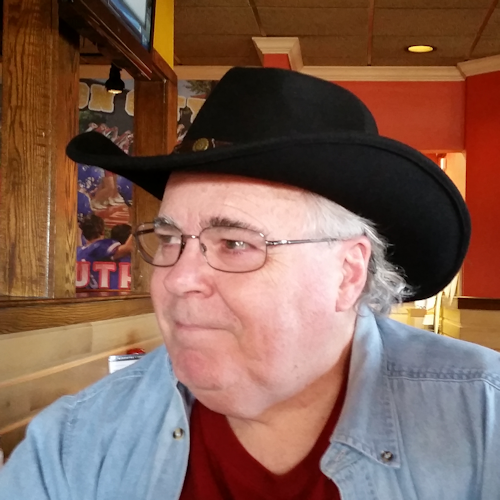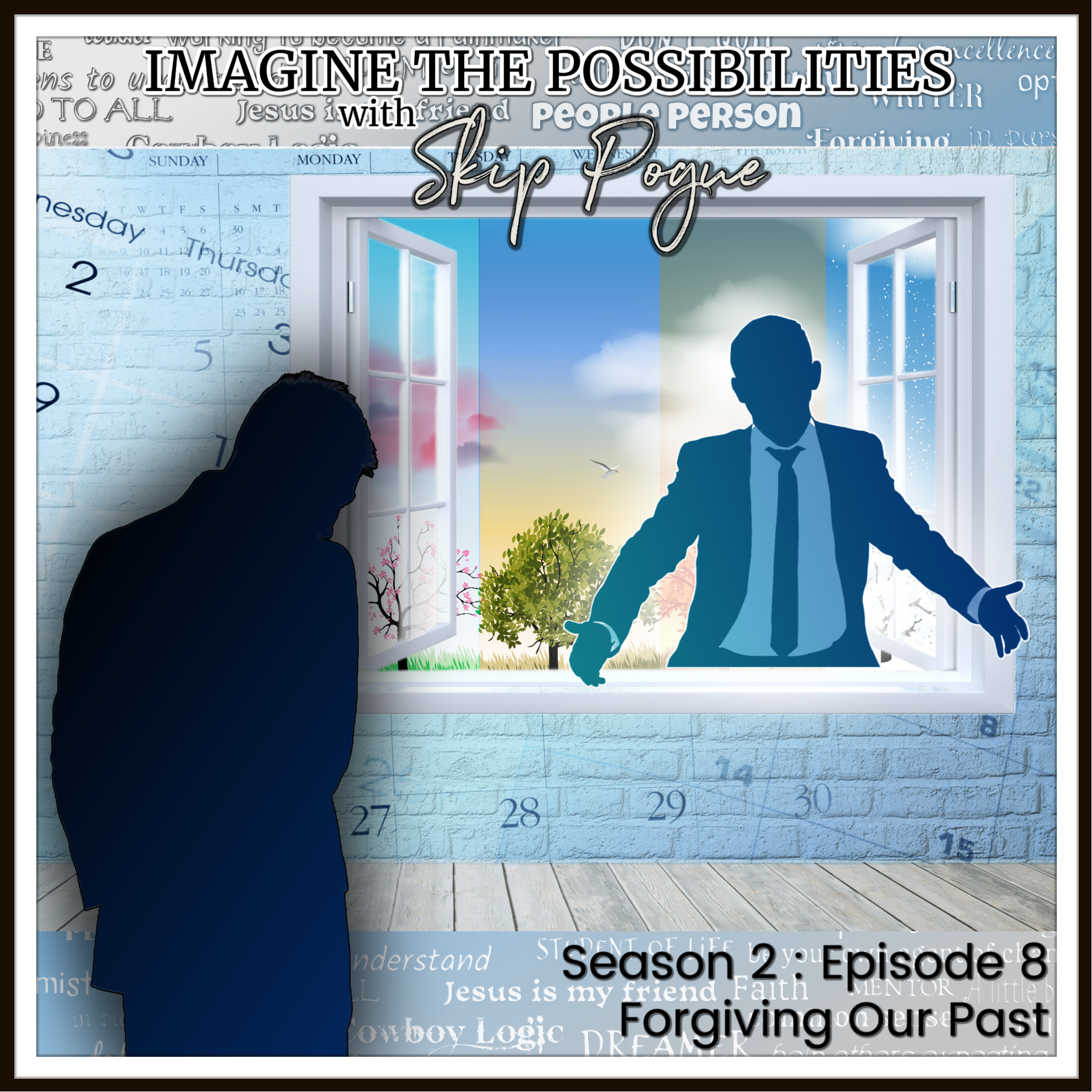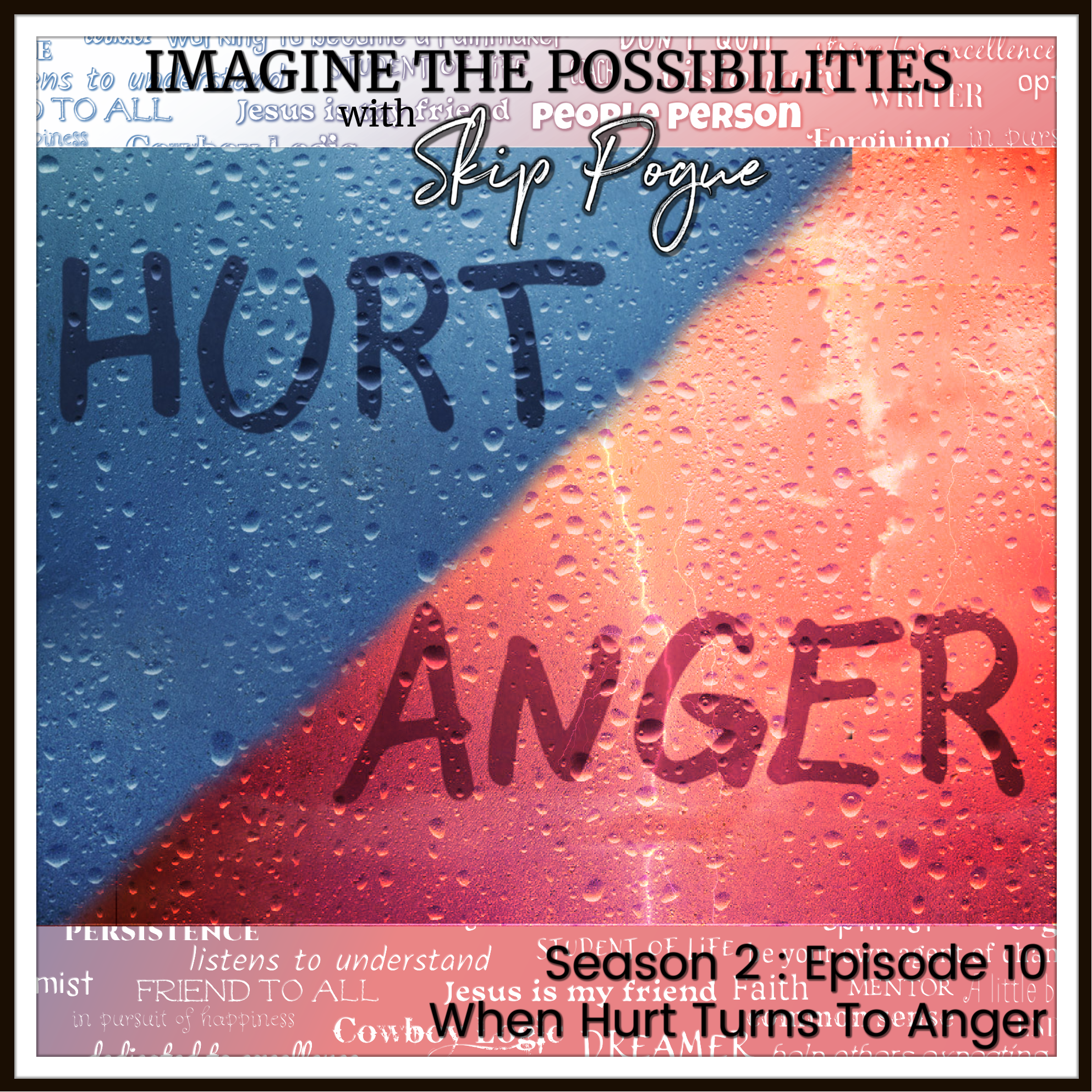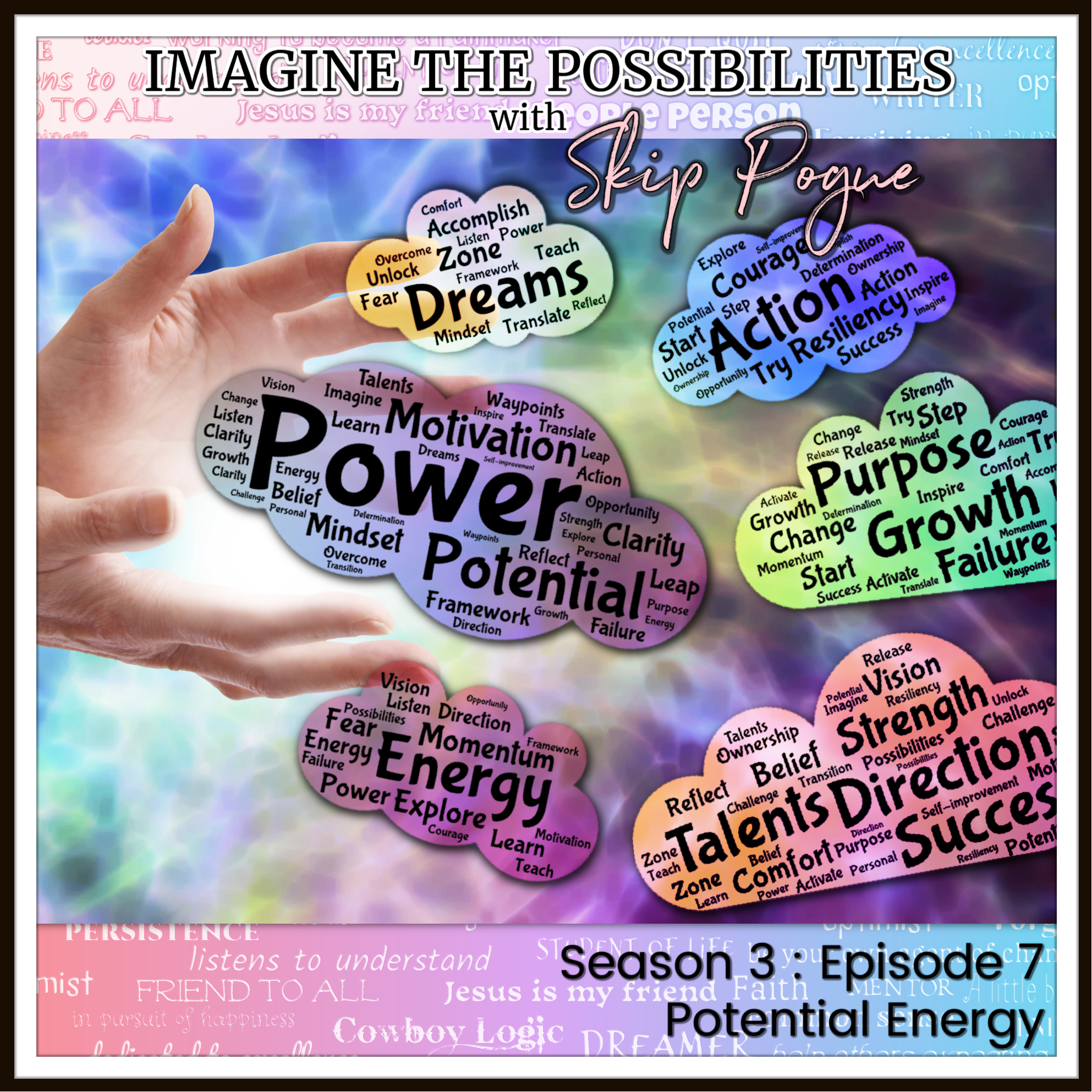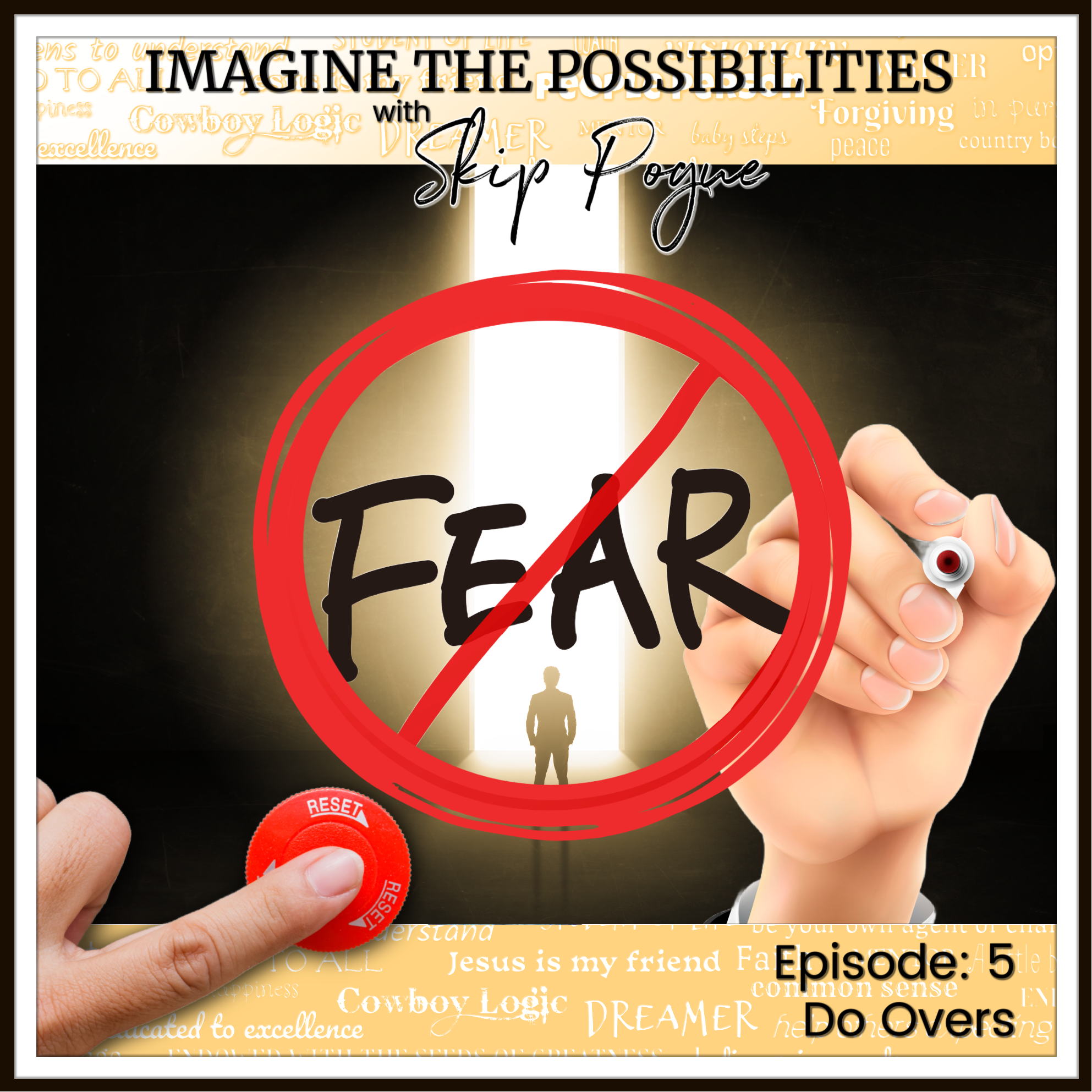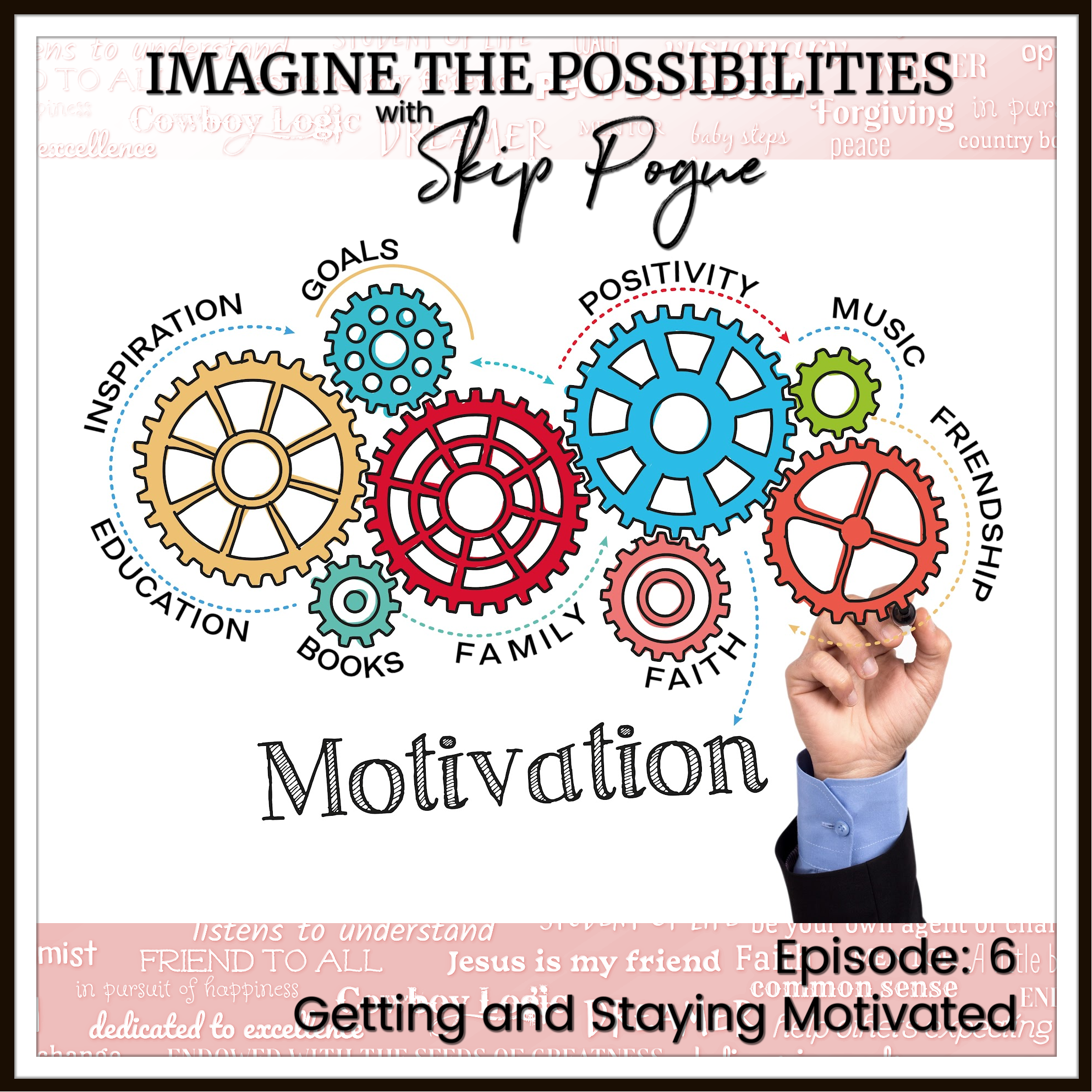Why do we take things so personally—and how do we stop? In this episode of Imagine the Possibilities, I’m diving into those emotional moments that leave us hurt, misunderstood, or just plain overwhelmed. We’ll talk about what’s really behind that sting, the ripple effects it can have, and the simple mindset shifts that can help us find peace. If you’ve ever walked away from a conversation and carried the weight for days—you’re not alone. Let’s unpack it together.
🎧 Listen now and join the journey toward letting go and living lighter.
View Full Transcript
Episode Transcript
[00:00:13] Hello and welcome to Imagine the Possibilities. My name is Skip Pogue. This is season two, Episode nine and it's titled Taking Things Personally. As I was working on this one and getting my notes up and everything, I realized that it kind of hits close to home for me. I've been in those moments, and I'm sure many of you have too, where someone says or does something and suddenly it feels like somebody just punched you. And that happens even when deep down I know they probably didn't mean it the way I took it. So today we're going to do a bunch of digging into that and try to figure out why do we take things so personally? And when we do, what does it do to our well being, our relationships, and how we see the world? Maybe more important than any of that is what can we do to stop carrying this emotional weight around with us day after day? Before we get started, I do want to recommend a book that's been very helpful in my own journey. It's the Four Agreements by Don Miguel Ruiz.
[00:01:23] The first time I read it, I was part of a book club on the Time Has Come network. I ordered it from Amazon and when it arrived I opened a package, got the book out and I flipped straight to the table of contents and I saw the four agreements listed right away. I knew number two was going to be a problem. For me, the reason was number two of the Four agreements is don't take anything personally.
[00:01:53] Anyway, the book offers four simple but powerful principles, all of which are rooted in ancient wisdom. It's designed to help you live with more freedom and peace of mind. For me, it really shifted how I see the world, especially when it came to how I respond to other people.
[00:02:13] That second agreement, don't take anything Personally, ties directly into today's topic. And I'll be honest, at times I still struggle with it. But the more I understand and talk about it, the better I feel. Hopefully this will help you too.
[00:02:28] So if what we're talking about today strikes a chord with you, I encourage you to check out the Four Agreements. It's a pretty easy and quick read, but the whole story is really powerful. Anyway, you can find it online or probably at your local bookstore. I ordered mine, like I said, from Amazon. And here's the thing, if you read it, I'd love to hear what you think about it. You can send me an email@imaginethepossibilities lifemail.com now grab a cup of coffee, take a deep breath, and let's walk through this together.
[00:03:06] First off, why do we take Things personally if we're honest about it. And this applies to me. I'm sure taking things personally is something that most of us deal with.
[00:03:17] That doesn't mean we're weak or overly sensitive. It just means we're human. But underneath that human reaction, there's usually something much deeper in play.
[00:03:28] It could be something like self doubt and insecurity. When we're not fully confident in ourselves, we tend to read criticism or even neutral comments as a personal attack. If you already doubt your abilities, someone's feedback can sure feel like confirmation for you of your worst fear. I've been there. I've heard something simple like are you sure that's the best way to do it? And suddenly it feels to me like they're saying you're not good enough.
[00:03:58] Another thing, past experiences and old wounds. Sometimes we're not reacting to the present moment. We're reacting to an old wound that hasn't quite healed. Maybe at some point we were criticized when we were growing up or felt overlooked in a past relationship. When something today mirrors that experience, our brain goes on alert. And the thing is, our brains are wired to protect us. But sometimes that protection comes in the form of reactiveness or defensiveness. Anyway, that's another thing, another way we can be bothered by things people say to us or do to us.
[00:04:37] Sometimes when somebody says or does something, we assume intent. We give that person too much credit. We imagine that they're thinking about us. A lot of times we imagine they're thinking about us a lot more than they really are. The truth is, most people are caught in their own world, their own stress, their own story. They're not worried about us. What they say or do might feel personal to us, but in reality, it's really more about them than us.
[00:05:09] We may have a need for validation if our self worth hinges on what other people think. Virtually any kind of criticism, intentional or not, can feel devastating to us. We start to tie our values to how others see us. And that's really a dangerous game to play because not everyone will see us clearly or see us the way we believe we are.
[00:05:35] How about emotional triggers? Now triggers came up. You know, I don't know, a few years back, everybody started using the word triggers. And I don't really like it, but it's here and it's here to stay. And I understand what they're talking about. So we all have triggers. There is no doubt about that. It can be as simple as a tone in a voice, a phrase that somebody says. The way they look at us and it's all about pushing our button. And even if they push our button accidentally, it can feel like a full blown attack on us. But again, most of the time it's not about what was said, it's about what we heard filtered through our own past.
[00:06:15] How about egos and identity? When we strongly identify with something could be our job, our role in the family, our beliefs. Any perceived challenge to that can feel like a personal assault. If I see myself as a good parent or a great worker and someone questions a decision I made, it can feel like they're questioning me.
[00:06:38] One of the things we tend to do in the world as it is today and as humans is view everything in a very simple, simplistic way. We see good or bad, right or wrong, whatever it is. We see two different diametrically opposite ways to view it. We don't see any middle ground or anything, just right or wrong, good or bad. And anytime we get feedback because of that, it can feel like it's not feedback. It's not constructive criticism, judgment. We miss that middle ground if we viewed it from the middle ground. Feedback can be kind and corrective or helpful without being harsh.
[00:07:21] Another big thing to consider in this is why it hurts more, depending on who says it. I mean, let's be real. Who says something can matter just as much as what they say? The problem is closer the relationship, the deeper the impact. When someone we love or respect says something critical, it hits us harder. Why? Because we care more, we trust them, and we expect them to see the best in us. And when they don't, it's a problem for us. And most of us believe respect equals credibility. So if we admire someone, their words carry more weight. So even a small critique can feel magnified because we do respect them and we do admire them. So it can. In our mind, it's larger than what they intended. On the flip side of that, if we don't respect the person, then we just tend to brush off their comments, even if what they said to us was true.
[00:08:20] Why it hurts more it depends sometimes on our emotional history. There are times a comment from today will remind us of something painful. From last week, last month, or years ago. Maybe at some point you had a boss who was overly critical, and now any feedback at work feels like a replay of that relationship. You go back to that boss no matter who says what to you.
[00:08:47] How about expectations versus reality? If we expect kindness and get bluntness, or we expect encouragement and get silence, that hurts. We've all experienced that disconnect between what we hope for and what actually happened.
[00:09:05] Take fear of rejection. As humans, we crave acceptance from people we care about. A sharp word or even lack of support can feel like rejection, even if that's not how it was intended. I'll give you an example on this one. I asked a member of the family at a point, it's been a few months ago, if they had listened to my podcast. Their response was, no, I don't listen to podcasts. And knowing the person, that's probably true. But I thought, you're a member of my family, I'm the one doing it. This is not a random podcast that you select somewhere you ought to listen to it. That's how it made me feel. After a little bit of personal reflection, I understood why they said what they said. But at that moment I was hurt. So those things bother us. That rejection about power and influence. In these cases, people with power, authority figures, bosses, teachers, mentors, have a louder voice in our lives. Their opinions can affect opportunity and that makes their word feel more personal.
[00:10:10] What I want to talk about now is what happens? What's the effect of taking things personally? What's the ripple effect from it? When we take things personally doesn't just stay inside us. It spills out into our lives, into our relationship, and it affects us in a bunch of different ways. We wind up carrying more stress and anxiety from it. Our self esteem takes a hit and another hit and another hit. We avoid risk, we avoid opportunities when they come up, and we avoid having honest conversations with people. And then add to that the fact that we'll overreact to things that don't deserve that much power over us. All those are things that affect us. But what about how these things affect others? This ripple effect affects other people. It can affect our family, our friends. And I know we've all experienced this from both our hurt and what we do. Sometimes it makes friends or family feel like they have to walk on eggshells. In the work environment, co workers will get gun shy of giving you feedback because they don't want to upset you. We can miss chances to build deeper and more honest relationships both within our family and within the workplace.
[00:11:30] The big thing that we need to think about and talk about is how do we shift our mindset? Because only by doing that can we correct some of this stuff. Now I'd like to tell you there's a switch located just behind your right ear that you can just press on and everything will be great. But you and I both know that's not true. So changing how we respond takes effort. It's not a single step. It's a journey. But it is possible to do that and complete the journey. Some things you have to do. The first one is remember through all this, it's usually not about you. If somebody does something or says something, before you crank yourself up, pause and ask this question. Could this be about what they're going through and not me? Could be. Take a breath before you react. Maybe just that small pause will change the way you react. It'll give you a second to think about it and maybe in that point of time you'll think, I'm okay. In your mind, reframe the situation. Instead of thinking that they don't like me or they don't respect me, reframe it in a way that says maybe they're overwhelmed or struggling right now and that's why they're acting the way they act. This one's really important. Build your self worth from the inside. Don't depend on other people. Don't let other people manage your self worth. The fact is that the stronger your inner confidence is, the less likely you are to be shaken by outside opinion. When somebody says something or does something, stop assuming the intent that you believe that you think. Just ask the questions. Clarify and don't jump to conclusions. Let go of needing to be like everyone else. Two things, two points to this. Number one, it's not possible to be like everyone. And number two, it's not your job to be like everyone. Focus on what you can control, your reaction. You can't control what others say, but you can control how you carry it, how you react to it. Always be kind to yourself. Give yourself grace. Because the fact is, we're all learning all the time. Build emotional resilience. Let tough moments be your teacher, not your tormentor. And I guess the last point I want to make is keep everything in perspective. When something going back to that word triggers somebody, says something, does something, before you react poorly to it, ask yourself this. Will any of this matter next week, next month, or next year? Put it in perspective and don't let it upset you. Here's some questions you can reflect on that helped me grow and hopefully will help you grow. And they're questions you have to ask yourself. When you do react poorly to something, Ask yourself, why did that affect me so deeply? Or was I expecting support and I didn't get it? Ask yourself, did I react in a way that reflects who I want to be? If you've got goals and aspirations, be, let's say a manager. Or a team lead. When you react the way you did, does that reflect on you wanting to be a manager or team lead? Because that's what you really want to always do is present yourself as someone that understands the position, the next position you want. Probably one of the most important reflective questions is what can I? Or what did I learn from this moment? It's all about learning something from it. If we react poorly or we don't react, or we react in such a way that it just diffuses the whole interaction, what can we learn from that? What did we learn from that moment? Here's a few things that I think I would call them takeaways. Not everyone will understand your heart, but that's okay. Pause before reacting. Grace often lives in that space between action and reaction. Clarify rather than assume you don't need everyone's approval. Let go and keep moving forward. I have this. I'm working on it. How's that?
[00:15:43] I guess that you would call this my reflection about taking things personally.
[00:15:50] I will not be defined by other people's opinions.
[00:15:55] My worth is in my purpose, my growth, and the impact I have on those who believe in what I am doing.
[00:16:03] I will pause, reflect, and choose to respond with calmness and clarity, not anger.
[00:16:12] I will release the things I cannot control and focus on what I can, those being my journey, my work, and the people who matter most.
[00:16:23] You're more than welcome to write that down and use it as something that inspires you or whatever.
[00:16:30] So take some time to think about all we've covered today, why we take things personally, how it affects our lives and relationships, and the small shifts we can make to handle things differently going forward. I truly hope that this episode gave you something to reflect on and maybe even a few tools to carry with you as you move throughout your own journey. I sincerely want to thank you for spending this time with me. I appreciate it more than you can imagine.
[00:16:57] I wish you much success. Remember that your future belongs to you. Stay humble, be kind, love unconditionally, and laugh often. I hope that you have a super day and I pray that God blesses you in a super way. Thanks again and God bless.
